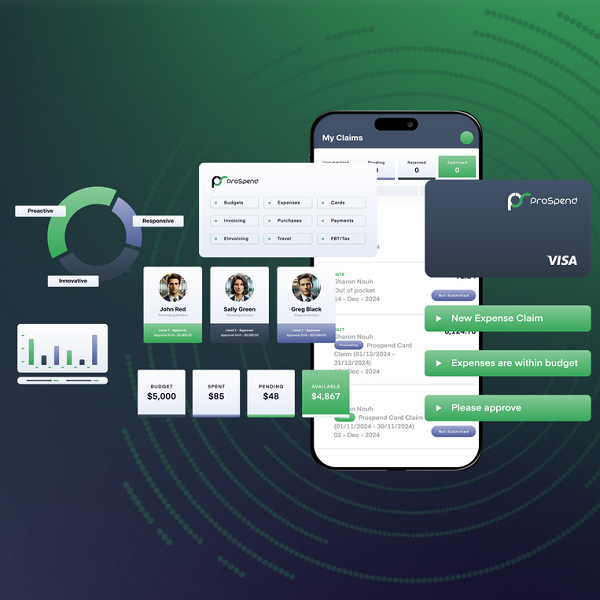
Navigating Modern Spend Management in the age of AI
By Sharon Nouh, CEO & Founder of ProSpend
More than ever before, forward-thinking finance leaders are moving away from traditional expense management not just to fix inefficiencies, but to gain strategic advantage. We speak to a number of finance leaders in our new report, Modern Spend and Expense Management: A CFO’s Guide to Financial Transformation. From the commentary, it’s clear that the adoption of unified spend management solutions has become a competitive necessity.
“Across industries, including education, healthcare, and professional services, there’s a clear shift toward integrated spend management platforms,” says Sujeet Jena, an experienced CFO with prior financial leadership roles at the National Institute for Dramatic Art and the University of New South Wales.
Jena says this transformation is driven by three essential capabilities:
- Real-Time Data: Modern platforms provide CFOs with instant visibility into spending, enabling smarter decision-making.
- Automation: AI-powered systems streamline approvals, flag anomalies, and reduce manual workloads.
- Regulatory Compliance: Integrated platforms make it easier to track spending against budgets and ensure adherence to industry regulations.
Tax consultant and business advisor Umair Awan notes that features like these significantly reduce manual intervention and drive efficiency by automating financial reporting, expense reconciliation, and invoice processing.
“Moreover, the shift towards cloud-based spend management solutions allows for enhanced scalability, real-time data access, and cross-functional collaboration within organisations,” Awan said.
Automation and AI
Financial experts see Artificial Intelligence (AI) as one of the driving forces behind spend management transformation, with practical applications already changing how businesses operate.
Riley Redford, CFO of software development and marketing company Xrii, highlights AI powered tools that support greater visibility, automation and virtual cards as the most significant industry shifts reshaping financial operations.
“For example, we use multi-currency accounts to automate forex conversions to achieve the best rate in preparation for our foreign currency subscriptions, simplifying subscription payments across different currencies,” Redford said.
“Expense tracking has evolved from manual processes to mobile-friendly tools that prompt users to upload receipts immediately after purchases. This not only saves time but also reduces unaccounted expenses.
“Looking ahead, I expect widespread adoption of predictive analytics and further automation. As AI matures, systems will proactively identify cost-saving opportunities and potential risks, turning financial management into a more dynamic, forward-looking process.”
Retief Lampen, CFO of advertising technology company iion, agrees that AI is a game changer. It reduces hours spent on repetitive tasks, allowing focus on high-value work instead.
“In five years, AI is likely to handle all capturing, tagging, and review work for expenses, freeing humans to analyse trends and deliver insights to optimise spending,” Lampen said.
Analytical Opportunity
Modern unified spend management platforms deliver better data visibility and reporting—bringing both insights and peace of mind to finance leaders.
“As more data is interrogated, spend management should be easier,” says Kerryn Divall, CFO for RSL New South Wales
Divall sees great promise in the analytical capabilities of advancing technology.
“Spend can be based on business-as-usual scenarios that can analyse past trends and then spend on new initiatives can be incorporated to test outcomes. Using AI, this should be done in a faster, more agile way,” Divall added.
Morgan Wilson, Founder and Director of Brisbane-based accounting firm Creditte, believes comprehensive platform unification drives both automation and visibility.
“Companies are moving toward integrated platforms that provide real-time visibility and predictive insights. Over the next five years, we’ll likely see increased adoption of autonomous finance solutions that may even automate reconciliation, detect anomalies instantly, and provide strategic forecasting, reducing the need for manual intervention,” Wilson said.
For mid-market CFOs navigating complex business environments, unified spend management platforms deliver both operational efficiency and strategic insight. Those who embrace modern solutions position their organisations to identify opportunities and drive growth in ways legacy systems cannot match.
This article is an adapted excerpt from a comprehensive report exploring spend management challenges and change. For more insights on transforming your financial operations, download the complete Modern Spend and Expense Management: A CFO’s Guide to Financial Transformation eBook.

